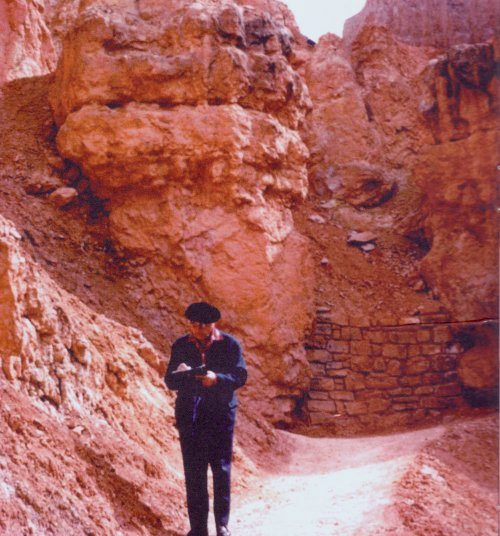Utah Symphony season to spotlight state’s natural beauties with Messiaen

Despite Utah’s many natural wonders, there have been few musical works written that have been influenced by our state’s imposing mountains or stunning red rock desert vistas.
One composer who found inspiration in Utah’s landscapes was the Frenchman Olivier Messiaen. Throughout his life, Messiaen traveled extensively, and in the early 1970s he and his wife, the pianist Yvonne Loriod, found themselves in the Beehive State where they spent several months.
Returning home to France, Messiaen took his impressions of what he saw (and heard) and wrote Des canyons aux étoiles. The result was a 12-movement work of interconnected tone poems depicting the state’s geography, along with the songs of some of the indigenous birds he heard on his trip.
Ever since Thierry Fischer was appointed the Utah Symphony’s music director in 2009, he has wanted to program Messiaen’s From the canyons to the stars…
“It is such a wonderful homage to nature,” he said recently in an interview with Utah Arts Review. “It captures the sacred character of the red rock landscape and also its depth and immensity.”
Up until now, the time and circumstances hadn’t been right for Fischer to go ahead and include it in a concert lineup. But he eventually managed to convince enough donors and board members to go along with his plans.
The Utah Symphony has performed Des canyons aux étoiles… once before, in 2007 as part of a week-long Messiaen festival in Salt Lake City. But instead of programming the 90-minute work as a whole on one concert, which–Fischer said, he had been discouraged from doing–he came up witha distinctive, and quite unusual, vision for presenting it.
Fischer–who announced in May that he will depart the Utah Symphony in 2022–decided to extend the performance of the work throughout this season by breaking it down into individual movements and using each section as a thematic basis for the program on which they appear.
“I had to get permission from the Messiaen Foundation to do that,” he said. “Once they agreed I went ahead with my plan and built programs around the separate movements.”

Olivier Messiaen taking notes for his Des canyons aux étoiles in Bryce Canyon in 1971.
Ultimately, Des canyons aux étoiles… will appear on eight of the 12 concerts Fischer will conduct in the 2019-20 season.
“I took the spirit of the titles to program the rest of each concert,” he said. “I wanted to bring cohesiveness to each program, but I also wanted the audience to enjoy the concerts and have fun.”
For this weekend’s season-opening program in Abravanel Hall, Fischer has come up with an eclectic array of works. The program opens with Beethoven’s overture to The Consecration of the House, to mark the 40th anniversary of Abravanel Hall. From there the evening takes a decidedly celestial spin with Kaija Saariaho’s Asteroid 4179: Toutatis; the overture to Haydn’s 1777 opera buffa The World of the Moon; and the main title from John Williams’ score to Star Wars.
The opening program will include two movements from Des canyons aux étoiles…. The third movement, “What Is Written in the Stars,” will be played first, then the opening movement, “The Desert,” before the main work of the concert, Gustav Holst’s monumental The Planets.
“I always try to be innovative,” Fischer said. “I think this will be an interesting program for the audience. He added practically, “This might be a success, but maybe it won’t be. We’ll just have to see.”
During his tenure as music director, Fischer has on occasion made some bold programming choices and courted controversy by pushing the repertoire envelope. A prime example of that was last season’s J.S. Bach/Pierre Boulez pairings.
Over the course of three concerts Fischer sandwiched a short piece by the French composer between two of Bach’s Brandenburg concertos. And although he felt that bringing two widely disparate stylistic periods together in close proximity made sense and was creatively sound and artistically valid, the conductor did admit that it didn’t go over well with more musically conservative audience members.
But that didn’t deter him from continuing along this line. And he sees the Messiaen connective thread this season as equally creative and innovative. “As musicians we must do what we believe in,” he said.
In that regard, finally being able to program Des canyons aux étoiles…is something Fischer genuinely believes in Olivier Messiaen’s unique creations. “I have a great love for Messiaen’s music,” he said. “I’ve conducted most of his major works, including the Turangalîla Symphony and Et exspecto resurrectionem mortuorum. He is a composer whose music is close to my heart.”
Fischer and the orchestra will record Des canyons aux étoiles…in Abravanel Hall at the end of the season in May as the latest installment of their series for Hyperion Records. “Hyperion was very willing to do it,” Fischer said. “In fact they pushed for it.” He expects it to be released sometime in 2021.
Fischer is thrilled that the Utah Symphony will at long last add its name to the list of recordings of this work. “I’m surprised that Abravanel never recorded it,” he said. “It is a work that the Utah Symphony should own, since it’s such a marvelous and vibrant depiction of Utah’s scenery.”
The Utah Symphony will play this program 7:30 p.m. Friday and Saturday in Abravanel Hall. utahsymphony.org; 801-355-2787. The program will also be performed 7:30 p.m. Thursday in Austad Auditorium in the Val A. Browning Center in Ogden.